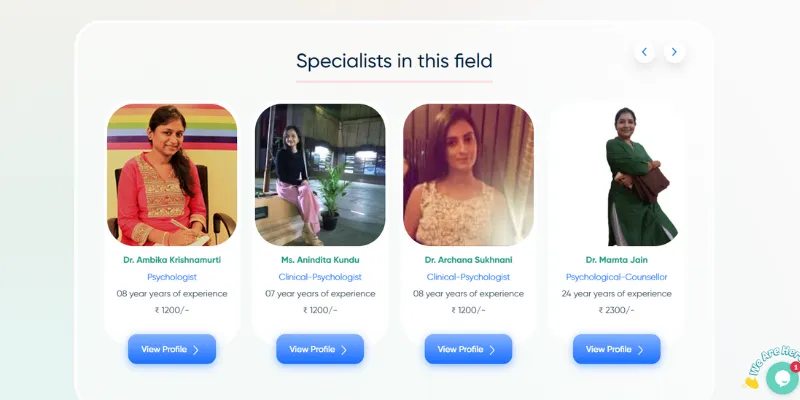This startup is enabling people to access resources for mental healthcare online
In 2019, Vivek Sagar and his daughter Shiya Sagar, established HopeQure, a mental wellness startup that enables people to obtain therapy and counselling through a secure virtual platform.
From the fear of losing livelihoods, the forlornness of being confined to the four walls of our room, to the apprehension surrounding symptoms like cold and cough, the COVID-19 pandemic has given rise to mass hysteria, collective anxiety, and a string of emotions that are affecting our mental health.
Several surveys and research studies have indicated an increase in mental health ailments after the outbreak of coronavirus. Practo, an integrated healthcare platform, reported a 665 percent jump in the number of mental health queries compared to 2019, with more than two-thirds of them coming from individuals aged 21 to 40. Anxiety, stress and panic attacks were some of the most common issues experienced.

The COVID-19 pandemic has resulted in a rise in the number of people suffering from mental health issues.
The bigger picture is not any better.
According to a survey conducted by the National Institute of Mental Health and Neuro Sciences (NIMHANS) in 2015-16, a staggering 13.7 percent of Indians suffer from some form of mental illness. The Bengaluru-based autonomous centre for neuroscience education also pointed out that among the 150 million Indians who desperately need mental health interventions, only 30 million have access to such care.
The lack of qualified mental health professionals, inadequate awareness levels, as well as the inherent stigma about the idea of undergoing therapy, are some of the reasons for this dire state.

Vivek Sagar and Shiya Sagar.
Vivek Sagar, who has been invariably involved in driving multiple social impact projects, wanted to bridge these gaps. So, in 2019, along with his daughter Shiya Sagar, he established HopeQure, a mental wellness startup that enables people to obtain therapy and counselling through a secure virtual platform.
“When I observed the huge treatment gap in the Indian mental health space, I began thinking about how it can be narrowed. And, leveraging technology to build resources seemed like a remedy,” Vivek Sagar, Founder and CEO, HopeQure, tells SocialStory.
Addressing mental health with tech
Before founding HopeQure, Vivek set up companies like Ingenico, Emvantage, and OfferZone.ai. He also worked with Amazon and Mastercard, and was involved in developing solutions in the fintech as well as healthtech sectors using AI, Deep Learning, voice and video BOT or 3DCGI models.
Shiya, on the other hand, is pursuing a Masters degree in Applied Clinical Psychology.
Vivek, Shiya, and their team of 20 built both a web-based solution and a mobile platform as part of HopeQure’s offering. Both these platforms not only provide the means to obtain online counselling and therapy, but also offer programmes that are tailor-made for specific target audiences.
The startup has onboarded and listed more than 650 qualified therapists, psychologists, and counsellors to facilitate virtual therapy.

A screenshot from the HopeQure web platform listing some of the qualified therapists.
“After exhaustive due diligence, we shortlisted a slew of credible mental health professionals. Any individual who is suffering from anxiety, depression, substance abuse, post-traumatic stress or the like can select a therapist of their choice and book an appointment online. Details about their qualification, work experience, languages known and fees charged are put up on the platform,” explains Vivek.
Besides this, the startup provides personalised mental health tool kits for schools, colleges, and corporates. While some of these focus on equipping students with cues on developing a positive body image, getting over exam anxieties and handling bullies, others are directed towards ensuring the mental health of employees.
The HopeQure platform also has several generic online programmes that list out tips to overcome stress, OCD, depression, addiction, and loneliness.

A webinar about the mental wellness of employees being hosted by the team of HopeQure.
“All the 50 odd programmes that we have developed involve a combination of self-help techniques, video counselling sessions, psychometric assessments, worksheets, and other online activities,” notes Vivek.
HopeQure claims to be the country’s only HIPAA-certified mental wellness startup, which means that the team has undertaken all the steps necessary to satisfy the policies and procedures as mentioned in the Health Insurance Portability and Accountability Act.
Enabling access to mental healthcare
While most of HopeQure’s programmes cost about Rs 2,000, the charges for the online therapy sessions are dictated by the counsellors and mental health professionals themselves. However, a small part of the fee is collected as a commission by the startup.
Though initially bootstrapped, Vivek is presently looking to seek funds from investors for further expansion. The startup is keen on delivering their offerings in the US over the next couple of months. Additionally, they are working towards building an iOS version of the app.

“One of the main challenges that we had to deal with was the stigma and lack of sensitivity around mental health in India. But, as more and more conversations are taking place, especially in the media, there seems to be an improvement,” Vivek adds.
Nivedita Sharma, a RCI-registered clinical psychologist who uses the HopeQure platform to hold counselling sessions is appreciative of the startup's offerings.
"I am very happy to be part of HopeQure’s effort to reach out to students, families, and MSMEs, and work towards the upkeep of their mental wellness through webinars, individual counselling and corporate employee mental wellness programmes," she says.
Edited by Kanishk Singh








